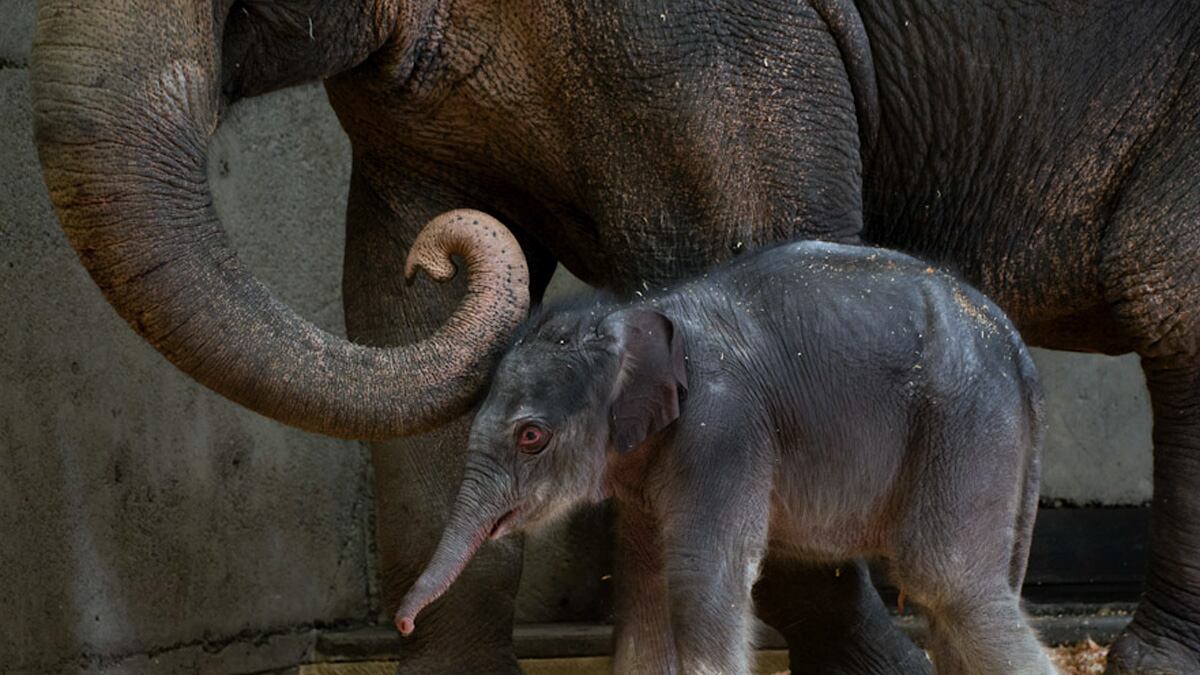This much is undisputed: the baby Asian elephant born last Friday at the Oregon Zoo is ridiculously cute. She’s all fuzzy and gangly and clumsy, and even at 300 pounds, you just want to roll her up in your arms and snuggle. Watch this video if you don’t believe us. Just try to stop yourself from saying “Awww” every five seconds.

But here’s what’s not so cute: that calf tumbled out of her mom’s womb and into a world of controversy, into a public-relations fiasco for that zoo and the baby’s actual owner: the private elephant ranch Have Trunk Will Travel, based in Perris, Calif. Things got so ugly this week that the zoo’s director, Kim Smith, found herself compelled to call a press conference, during which bloodthirsty reporters were practically stepping on themselves to fire the next hardball question. At the director of a zoo. Several times during the highly tense 37-minute session, Smith had to implore of the media mob that they “take turns.”
Why the outcry? Coincidentally or not, the Seattle Times published an investigative series the same weekend the yet-to-be-named calf took her first bites of hay. The series’ thesis: pachyderms in captivity die way too often. And one of those stories was about this particular baby, the offspring of Rose-Tu (mom) and Tusko (dad.) About how that baby might be yanked away from her big gray loving mom at some point and shipped off to do tricks for Have Trunk Will Travel, which animal-rights activists accuse of abusing elephants. Turns out, Have Trunk Will Travel actually owns that little baby elephant, Rumpelstiltskin style. The company also owns Rose-Tu’s fourth offspring, and her sixth. And that means the company has the right to take her away.
“I can’t wait to hug her,” the company’s owner, Kari Johnson told the Times.
This revelation prompted an outcry from elephant lovers all over the country. How dare they take that baby from her mom? Who signed off on some contract that gives away ownership rights to the unborn children of the Oregon zoo’s elephants?
Even Bob Barker got involved. When Bob Barker is on your case, you’ve got a public-relations fiasco on your hands.
“I urge the Oregon Zoo to withdraw from their agreement with Have Trunk Will Travel,” the former Price Is Right host said in a press release put out by Animal Defenders International on Wednesday, “in consideration of the video evidence of their abuse of their elephants.”
Johnson didn’t respond to an inquiry from The Daily Beast on Friday, but she told The Oregonian that the video clips alleging abuse were taken out of context.
Smith did her best, at that press conference, to straighten the whole mess out. The zoo signed the contract because it wanted to borrow Tusko. Animals in the zoo are owned by other entities because it’s just not practical, economically, for a zoo to own every animal on its grounds.
“This is not an agreement that bears on where this animal lives,” Smith said. “Where the animal lives is at the Oregon Zoo.”
But what guarantee is there that Have Trunk Will Travel isn’t going to come collect on the contract, the reporters grilled her? She didn’t answer, because there is no answer. At least, there is no guarantee. That’s the whole point of the contract, which the zoo signed in 2005 in exchange for the company loaning Tusko to the zoo to mate with Rose-Tu. You want our elephant sperm, we want half the offspring. The first calf, a male named Sumudra, goes to the zoo. The second, fourth, and sixth are owned by Have Trunk Will Travel.
Smith, and the owners of Have Trunk Will Travel, both insist now that this calf was “never” going to be taken from her mommy, that the “breeding loan” that spells out ownership of these calves is really just part of a larger system overseen by the American Zoo Association, a sort of matchmaking of captive animals across the country so that their genes can be spread around from one institution to the next, between public and private institutions.
“Have Trunk Will Travel has no intention and has never had any intention of coming to take Rose-Tu’s calf,” the company wrote in a statement. “Have Trunk Will Travel supports Oregon Zoo’s vision for elephants and has great appreciation for the way they care for elephants. We are very proud of the significant contribution we have made together for Asian elephants. We could not be more excited about the birth of this new calf.”
All accredited AZA institutions sign off on “species survival plans” for each animal, AZA spokesman Steve Feldman told The Daily Beast, that dictate where elephants go and how they’re cared for. It’s all about keeping elephant populations genetically diverse, Feldman said, and about a “community” of caregiving for the various species involved.
“When you get everyone who loves elephants together, they all collaborate on sharing health research, veterinary advancements,” Feldman said. “They work together to fund projects on elephant conservation all over the world.”
The ownership agreement, which is “quite unique,” Feldman said, is pretty much a formality.
“Do you have a dog? Somebody has to own your dog,” he said. “It can’t just be there.”
But what of the money that is sometimes involved in said transfers of ownership? What does that have to do with good animal husbandry and biodiversity?
“Sometimes money changes hands,” Feldman said. “Many times it doesn’t.”
Catherine Doyle doesn’t buy that explanation for a second. She’s the director of science, research, and advocacy for the Performing Animal Welfare Society, which sent Rose-Tu’s breeding contract to the Seattle Times in the first place, and she says the chief reason for all this elephant peddling and breeding is because elephants are a huge, uh, cash cow, for public and private institutions alike. And because they are dying at such alarming rates, as described adroitly in the Times’s series, everyone who houses (and ultimately makes money from) elephants wants badly to have them, and breed them.
“Zoos are desperate to breed more crowd-attracting babies, at any cost,” because elephants simply are not thriving in zoos,” Doyle told The Daily Beast. “This is a business transaction.”
Smith tried several times at that press conference, for example, to avoid the question of whether she could “guarantee” the baby elephant would stay at the zoo. She can’t guarantee that—unless the zoo buys the elephant from Have Trunk Will Travel, for a yet-to-be-determined sum. Both Doyle and Feldman agree the only reason the zoo and the company are negotiating for that sale is because the public found out about the breeding contract, and is demanding it.
“They were caught with their pants down,” Doyle said.
But that’s all those two agree on.
Feldman says the breeding contract is about accountability, about one accredited AZA member reserving the right to take an animal back if that member doesn’t like the way the creature is being treated.
To Doyle, there’s no way the baby elephant that is owned by a private company that makes money giving elephant rides and renting elephants out for parades and movies and training elephants to do tricks at shows is just going to allow a calf to which it has contractual rights to live at a zoo in perpetuity. The reason Have Trunk insists upon a breeding agreement is to insure that they either get the valuable animal or get a payment in lieu of that animal, she says. One elephant contract Doyle also obtained, this one between the company and the Houston Zoo, included a clause that the zoo could buy that elephant for $500,000. That’s recognition of how valuable that elephant was to that company.
Provided the zoo and the company can come to terms, then, Rose Tu’s calf will stay in Oregon (and even if she doesn’t, the soonest Have Trunk Will Travel could take her is after she turns 3 years old.)
This week’s hubbub, Feldman insists, is merely about “a Seattle Times reporter eager for a scoop, not understanding the system I’ve just described. Everyone has said the calf is staying there. The only person who ever tried to say different was the Seattle Times reporter.”






